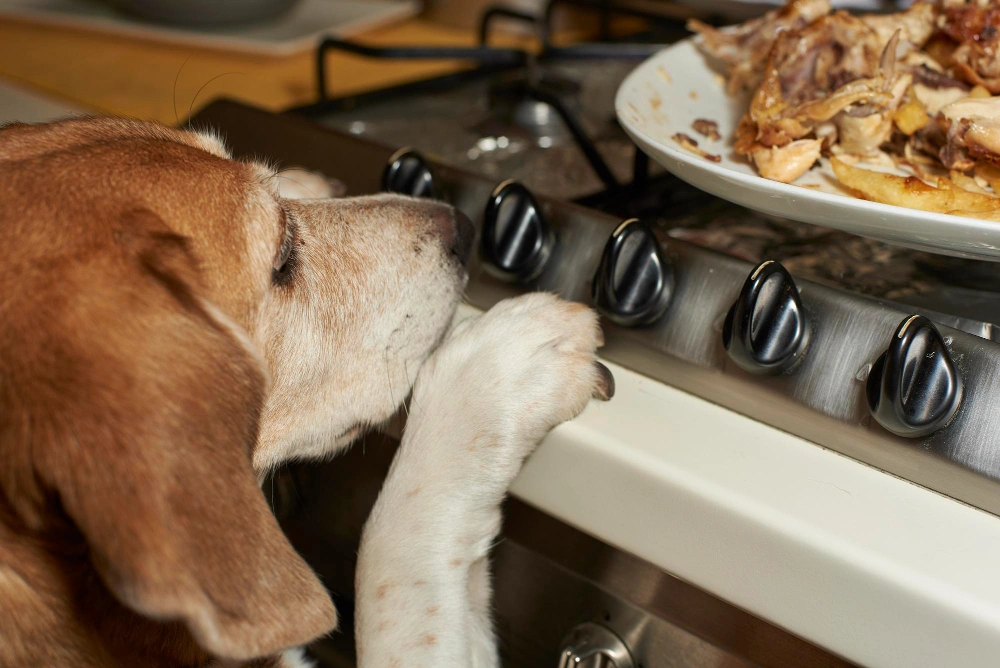Large breed dogs require specialized nutrition to maintain their health, energy levels, and joint function throughout their lives. While commercial dog foods can be expensive and sometimes contain unwanted additives, homemade dog food recipes for large dogs offer a cost-effective, natural alternative that lets you control every ingredient that goes into your furry friend’s bowl.
Creating nutritious homemade meals for your German Shepherd, Labrador, Golden Retriever, or Great Dane does not have to be complicated. With the right balance of proteins, carbohydrates, healthy fats, and essential nutrients, you can prepare delicious meals that support your large dog’s unique dietary requirements while saving money on premium commercial foods.
Understanding Large Breed Nutritional Needs
Large breed dogs weighing over 50 pounds have distinct nutritional requirements compared to smaller dogs. These gentle giants need carefully balanced nutrition to support their bone development, maintain healthy joints, and fuel their active lifestyles. Adult large breed dogs typically require 20-30 calories per pound of body weight daily, depending on their activity level and metabolism.
Key nutritional considerations for large breeds include controlled calcium and phosphorus ratios to prevent developmental orthopedic diseases, adequate protein for muscle maintenance (minimum 18% for adults), and joint-supporting nutrients like glucosamine and omega-3 fatty acids. Additionally, large dogs benefit from easily digestible ingredients that reduce the risk of bloat and gastric torsion.
Essential Ingredients for Homemade Large Dog Food
Before diving into specific recipes, it is important to understand which ingredients provide the best nutrition for your large breed companion. High-quality protein sources should form the foundation of every meal, including lean meats like chicken, turkey, beef, fish, and eggs.
Complex carbohydrates such as sweet potatoes, brown rice, quinoa, and oatmeal provide sustained energy and fiber for digestive health. Healthy vegetables like carrots, spinach, broccoli, and pumpkin supply essential vitamins, minerals, and antioxidants that support immune function and overall wellness.
Do not forget about healthy fats, which are crucial for coat health and nutrient absorption. Sources like fish oil, flaxseed oil, and coconut oil provide omega-3 and omega-6 fatty acids that reduce inflammation and support brain function.
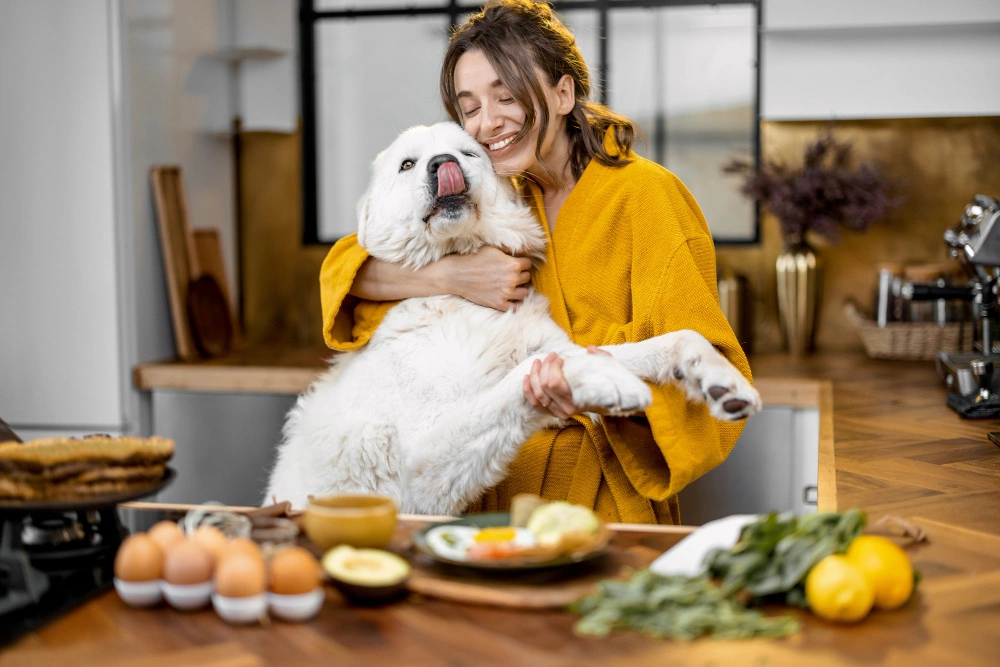
Recipe 1: Protein-Packed Chicken and Sweet Potato Bowl
This balanced recipe provides excellent nutrition for active large breed dogs while being gentle on sensitive stomachs.
Ingredients:
- 2 pounds boneless, skinless chicken thighs
- 2 cups cooked sweet potatoes, diced
- 1 cup cooked brown rice
- 1 cup steamed green beans, chopped
- 1/2 cup carrots, finely diced
- 2 tablespoons fish oil
- 1 tablespoon ground flaxseed
Instructions: Cook chicken thoroughly and shred into bite-sized pieces. Combine all ingredients in a large bowl and mix well. This recipe yields approximately 8 cups and can be stored in the refrigerator for up to 4 days or frozen in portion-sized containers.
Recipe 2: Beef and Quinoa Power Bowl
This nutrient-dense recipe is perfect for highly active large breed dogs who need extra protein and energy.
Ingredients:
- 2 pounds lean ground beef (85/15)
- 1.5 cups cooked quinoa
- 1 cup steamed broccoli, chopped
- 1/2 cup pumpkin puree
- 1/4 cup spinach, chopped
- 2 tablespoons olive oil
- 1 tablespoon nutritional yeast
Brown the ground beef completely, drain excess fat, and let cool. Mix with remaining ingredients for a protein-rich meal that supports muscle development and sustained energy.
Recipe 3: Fish and Vegetable Medley
Rich in omega-3 fatty acids, this recipe promotes healthy skin, coat, and joint function.
Ingredients:
- 2 pounds salmon fillets, cooked and flaked
- 2 cups cooked barley
- 1 cup steamed cauliflower, mashed
- 1/2 cup blueberries
- 1/4 cup chia seeds, ground
- 2 tablespoons coconut oil
This anti-inflammatory recipe is especially beneficial for senior large breed dogs or those with joint issues.
Recipe 4: Turkey and Pumpkin Digestive Support
Ideal for dogs with sensitive stomachs or digestive issues, this gentle recipe provides easily digestible nutrition.
Ingredients:
- 2 pounds ground turkey (93/7 lean)
- 1 cup pumpkin puree
- 1.5 cups cooked white rice
- 1/2 cup plain Greek yogurt
- 1/4 cup parsley, chopped
- 1 tablespoon bone meal powder
The probiotics in yogurt and fiber in pumpkin support digestive health while providing complete nutrition.
Recipe 5: Lamb and Lentil Protein Bowl
This novel protein recipe is excellent for dogs with common protein allergies.
Ingredients:
- 2 pounds ground lamb
- 1 cup cooked red lentils
- 1 cup cooked sweet potato, mashed
- 1/2 cup zucchini, diced
- 1/4 cup fresh mint, chopped
- 2 tablespoons hemp seed oil
Lamb provides high-quality protein while lentils add fiber and plant-based protein for balanced nutrition.
Recipe 6: Organ Meat Superfood Mix
Packed with essential nutrients, this recipe incorporates organ meats for optimal nutrition.
Ingredients:
- 1.5 pounds chicken breast, cooked
- 0.5 pounds chicken liver, cooked
- 1.5 cups cooked oatmeal
- 1 cup steamed Brussels sprouts, chopped
- 1/2 cup cranberries, unsweetened
- 2 tablespoons flaxseed oil
Organ meats are nutritional powerhouses, providing vitamins A, B, and iron essential for large breed health.
Recipe 7: Senior Large Breed Support Formula
Specially formulated for older large dogs with reduced activity levels and special nutritional needs.
Ingredients:
- 2 pounds white fish, cooked and flaked
- 1 cup cooked millet
- 1 cup steamed squash, mashed
- 1/2 cup bone broth, low sodium
- 1/4 cup turmeric paste
- 2 tablespoons MCT oil
This gentle, anti-inflammatory recipe supports cognitive function and joint health in senior dogs.
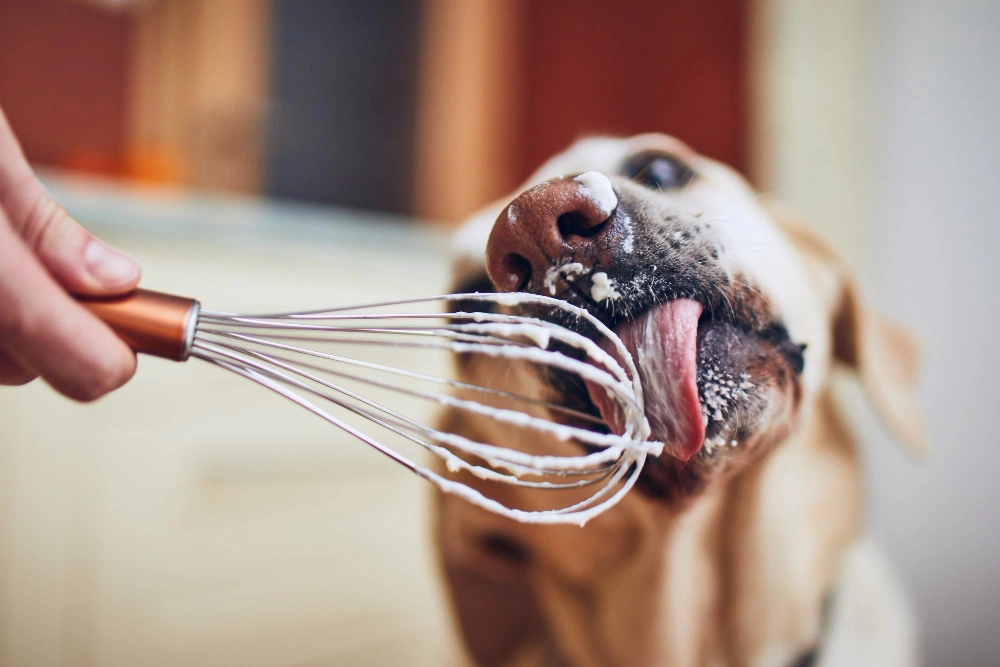
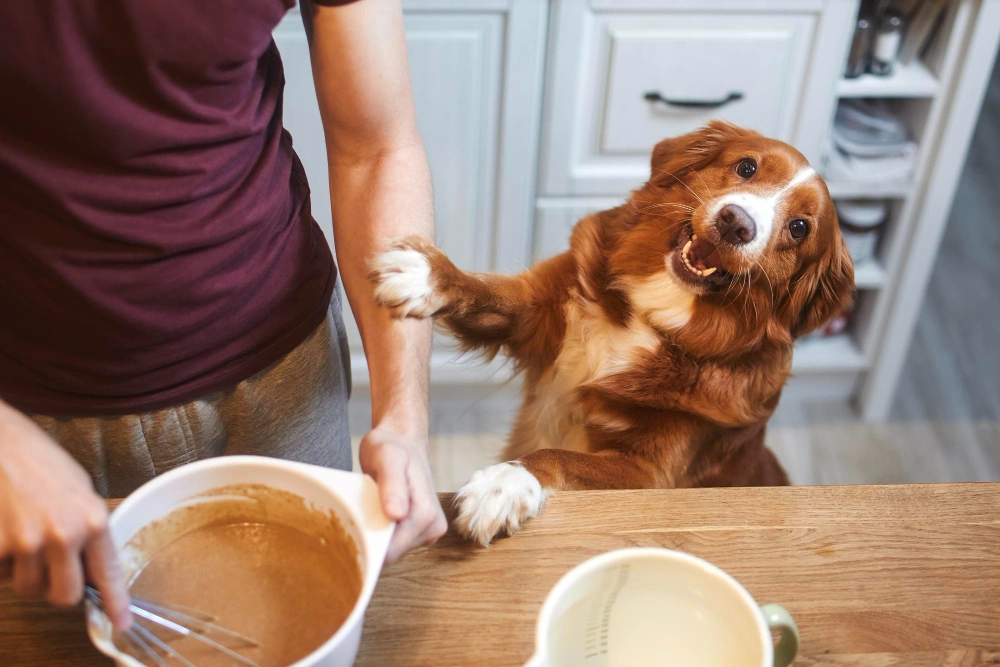
Preparation and Storage Tips
When preparing homemade dog food recipes for large dogs, always cook proteins thoroughly and allow meals to cool completely before serving. Prepare meals in large batches to save time, and consider investing in a food scale to ensure consistent portions.
Store prepared meals in airtight containers in the refrigerator for up to 4 days or freeze in individual serving sizes for up to 3 months. Always thaw frozen meals completely and bring to room temperature before serving.
Important Safety Considerations
While homemade dog food can be incredibly beneficial, it is crucial to avoid ingredients toxic to dogs. Never include onions, garlic, grapes, chocolate, xylitol, or avocado in your recipes. Always consult with your veterinarian before transitioning to a homemade diet, especially if your dog has health conditions or is on medication.
Consider adding a canine multivitamin or specific supplements as recommended by your vet to ensure nutritional completeness. Gradually transition from commercial to homemade food over 7-10 days to prevent digestive upset.
Frequently Asked Questions
Q: How much homemade food should I feed my large breed dog?
Large breed dogs typically need 2-4 cups of homemade food daily, depending on their weight, age, and activity level. A 70-pound dog usually needs about 3-3.5 cups daily, divided into two meals. Always monitor your dog’s weight and adjust portions accordingly.
Q: Can I make homemade dog food without meat?
While possible, vegetarian diets for dogs require careful planning with a veterinary nutritionist to ensure adequate protein and essential amino acids. Dogs are omnivores but thrive best with animal protein sources in their diet.
Q: How long does it take to see improvements after switching to homemade food?
Most dogs show improvements in coat quality, energy levels, and digestion within 2-4 weeks of switching to a balanced homemade diet. However, individual results may vary based on the dog’s previous diet and overall health.
Q: Is homemade dog food really more cost-effective than commercial food?
Yes, homemade dog food typically costs 30-50% less than premium commercial foods. Buying ingredients in bulk and preparing large batches can significantly reduce per-serving costs while providing superior nutrition.
Q: Do I need to add supplements to homemade dog food?
Most balanced homemade diets benefit from calcium supplementation (bone meal or calcium carbonate) and a canine multivitamin. Consult your veterinarian for specific recommendations based on your recipes and your dog’s needs.
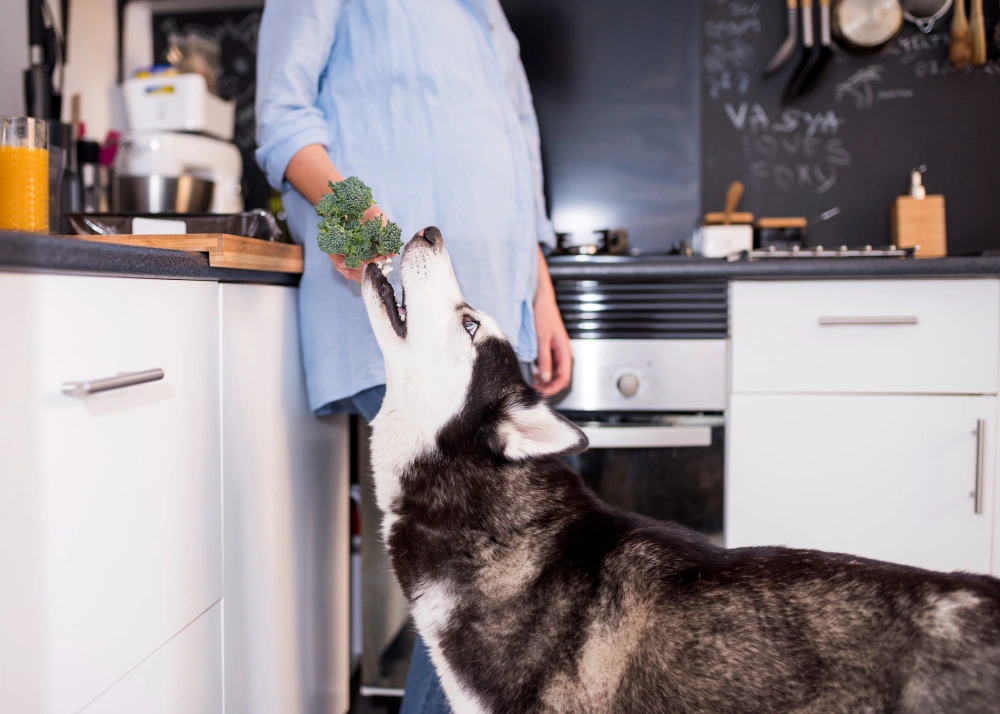
Final Thoughts
Creating homemade dog food recipes for large dogs is a rewarding way to provide optimal nutrition while building a stronger bond with your canine companion. These seven vet-approved recipes offer variety, balanced nutrition, and cost savings while supporting the unique health needs of large breed dogs.
Remember that every dog is individual, and what works well for one may need adjustment for another. Start slowly, monitor your dog’s response, and do not hesitate to consult with your veterinarian throughout the transition process. With patience and attention to detail, you can provide your large breed dog with delicious, nutritious meals that support their health and happiness for years to come.
Citation
Redgirl. (2025, April 21). Homemade dog food. Allrecipes. https://www.allrecipes.com/recipe/140286/homemade-dog-food/
This Mess Is Ours. (2025, February 25). Easy homemade dog food recipe. https://thismessisours.com/easy-homemade-dog-food-recipe/
Stregowski, J. (2025, June 20). Vet-Approved Homemade dog food Recipes: Keep your pet healthy and happy. The Spruce Pets. https://www.thesprucepets.com/homemade-dog-food-recipes-5200240

